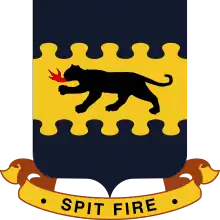Tuskegee Airmen
The Tuskegee Airmen /tʌsˈkiːɡiː/ is the popular name for a group of African-American military pilots (fighter and bomber) who fought in World War II. Formally, they formed the 332nd Fighter Group and the 477th Bombardment Group of the United States Army Air Forces. The name also applies to the crew members and supportpersonnel. Their units were all black and all segregated.[1] They had an outstanding record. As fighter escorts they had the reputation that not a single bomber was lost to enemy action while being escorted by Tuskegee airmen.[1]
| Tuskegee Airmen (unofficial) | |
|---|---|
 Emblems of wing | |
| Active | 1940–1952 |
| Country | United States |
| Branch | United States Army Air Corps United States Army Air Forces United States Air Force |
| Role | Fighter unit |
| Part of | 332nd Fighter Group (99th Fighter Squadron, 100th Fighter Squadron, 301st Fighter Squadron, 302d Fighter Squadron), 477th Medium Bombardment Group (616th Bombardment Squadron, 617th Bombardment Squadron, 618th Bombardment Squadron, 619th Bombardment Squadron) |
| Nickname(s) | Red Tails Red-Tail Angels |
| Motto(s) | Spit Fire |
| Engagements | World War II |
The Tuskegee Airmen were the first African-American military aviators in the United States Armed Forces. During World War II, Black Americans in many U.S. states were still subject to the Jim Crow laws.[2] Most Tuskegee pilots were trained at Tuskegee Army Airfield[3] in Tuskegee, Alabama. Training bomber crews took longer than training fighter pilots and the war was won before they finished. Navigators and other crew members trained at various army based in the US.[3]
References
- Alan Axelrod, The Real History of World War II: A New Look at the Past (New York: Sterling Publishing Company, 2008), p. 319
- Barry M. Stentiford, Tuskegee Airmen (Santa Barbara, CA: Greenwood, 2012), pp. 7–9
- Joseph Caver, Jerome A. Ennels, Daniel Lee Haulman, The Tuskegee Airmen: An Illustrated History, 1939-1949 (Montgomery, AL: NewSouth Books, 2011.), p. 83